Introduction
The realm of family law marketing is characterized by its intricate emotional landscape and the unique challenges it presents. Unlike other legal fields, family law deals with sensitive matters such as:
- Divorce
- Custody disputes
- Domestic violence
This necessitates a marketing approach that balances strategic outreach with genuine empathy. In an age where digital presence is paramount, family law firms must ensure they are easily discoverable online, as a significant percentage of potential clients turn to their mobile devices for legal assistance.
This article delves into the essential strategies family law firms can employ, including:
- Optimizing digital engagement
- Establishing a strong brand identity
All aimed at building trust and effectively reaching clients during their most vulnerable times. By understanding and leveraging these marketing dynamics, firms can enhance their visibility, improve client communication, and ultimately foster lasting relationships that contribute to their success.
Understanding the Unique Landscape of Family Law Marketing
The promotional landscape for family law is uniquely defined by its sensitivity and emotional intricacies. Unlike other legal sectors, family law addresses deeply personal issues, including divorce, custody battles, and domestic violence. This necessitates a marketing for family law strategy that not only emphasizes strategic outreach but also embodies empathy.
Family law practices must delicately navigate the emotional challenges their patrons face, all while remaining compliant with legal advertising regulations. Notably, 50% of individuals searching for local legal services on mobile devices will visit a law office within 24 hours, highlighting the critical importance of being discoverable online. Employing resources like Google Business Profile and online directories can greatly improve this visibility, ensuring that prospective customers can effortlessly discover and connect with the organization.
Furthermore, it is essential to address the alarming statistic that 35% of prospective customers’ phone calls go unanswered, indicating a significant gap in communication. This highlights the necessity for family law practices to develop effective marketing for family law that connects with individuals during their most challenging moments, ultimately enhancing engagement and conversion rates.
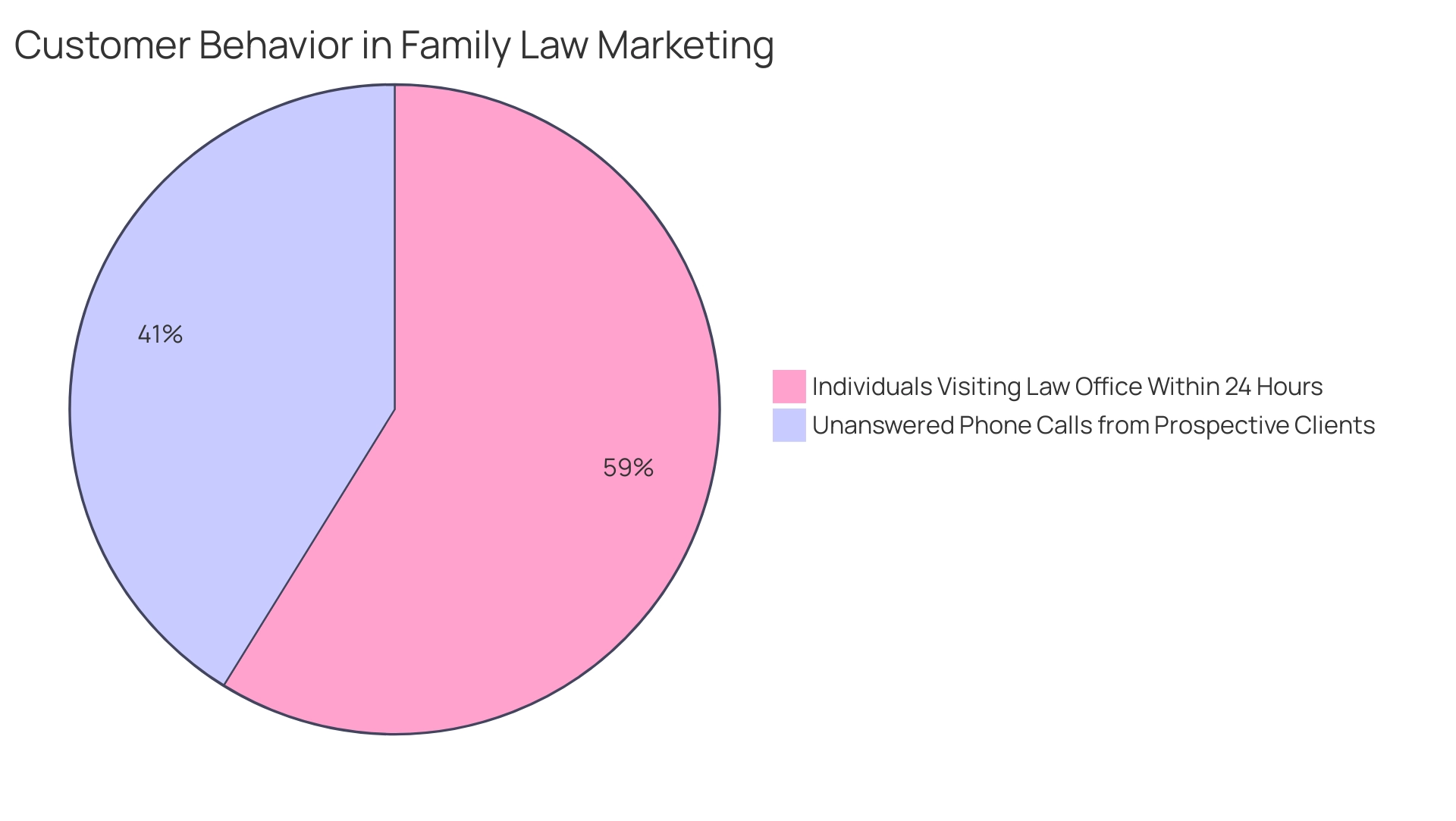
Leveraging Digital Strategies for Effective Client Engagement
In today’s digital environment, family legal practices must utilize a range of online tactics for effective marketing for family law to connect with prospective customers. Enhancing websites for user experience is essential, as 46% of customers indicate making their initial contact via phone, reflecting a preference for direct communication. Moreover, 72% of family law seekers favor traditional phone calls over newer communication methods, indicating that while digital outreach is essential, personal touchpoints remain critical.
Employing pay-per-click (PPC) advertising enables businesses to focus on individuals actively seeking legal help, making it a powerful asset in the promotional arsenal. According to recent statistics, PPC advertising can yield a return on investment of up to 200% in legal services, underscoring its effectiveness. Engaging content that addresses prevalent family law concerns is essential in marketing for family law, as it builds trust and motivates potential individuals to initiate consultations.
For example, a case study named ‘Blog Utilization in Legal Practices’ shows that 89% of legal organizations that use blogs do so for business development, illustrating the dual purpose of blogging for promotion and personal interaction. Furthermore, maintaining an active presence on social media platforms enhances customer engagement and reinforces a firm’s commitment to customer care. As Nicole Farber, CEO of ENX2 Marketing, states,
With degrees in business and informational technology, I have a track record of turning around failing businesses and offering a fresh look at taking your marketing to the next level.
This holistic method of digital engagement is essential for effective marketing for family law, as it not only draws in new customers but also fosters enduring connections with current ones. To gauge the effectiveness of these strategies, vital tools like Google Analytics for website traffic and CRM software for overseeing customer relationships are invaluable.
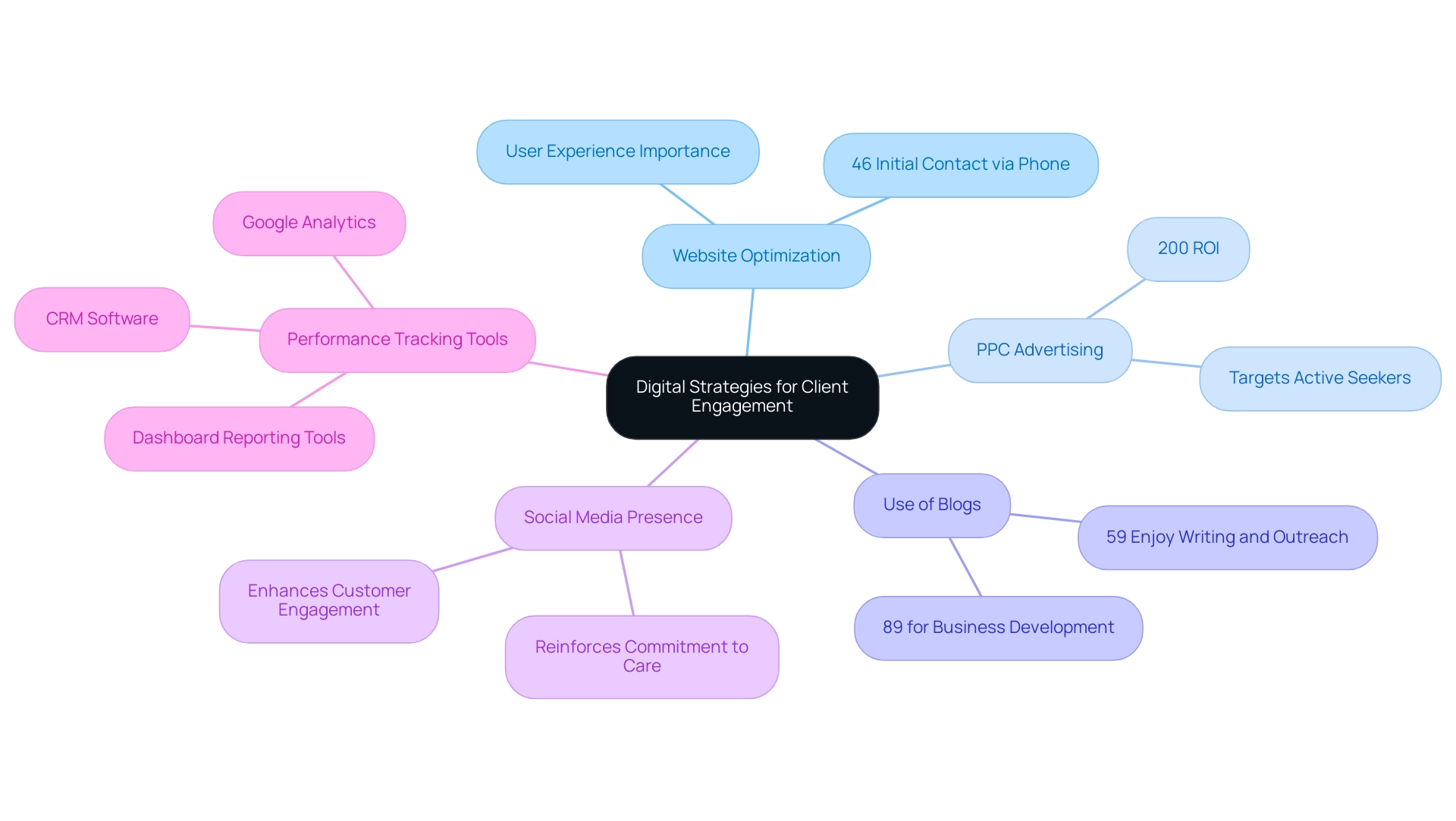
Building Trust: The Role of Brand Identity in Family Law Marketing
Brand identity is a crucial component in the marketing for family law practices, deeply influencing how prospective customers view their services. A well-designed brand that embodies empathy, expertise, and reliability not only enhances a company’s appeal but also acts as a foundation for establishing trust with customers. This encompasses a range of elements, from visual aspects like logos and color schemes to the messaging and core values communicated through marketing materials.
Moreover, a legal practice with a strong brand can command higher fees, attract esteemed patrons, and secure strategic partnerships, which highlights the concrete advantages of a robust brand identity. Reputation management plays a crucial role in this context; positive testimonials and compelling case studies serve to elevate a company’s credibility, while negative reviews can significantly diminish consumer interest. For instance, family law practices that have successfully built trust through branding, such as those highlighted in case studies on effective brand identity, demonstrate how strategic branding can lead to enhanced client relationships.
As Lisa Hart Shepherd from Harvard Law School asserts,
A legal practice with a strong brand will receive more inquiries, and its approaches to prospects will be greeted more warmly.
Additionally, effective branding enhances digital promotion efforts, making social media and online ads more recognizable and engaging. Family law practices that prioritize the development of a robust brand identity are strategically positioned for effective marketing for family law, helping to cultivate trust and nurture lasting relationships, ultimately leading to greater success in their operations.
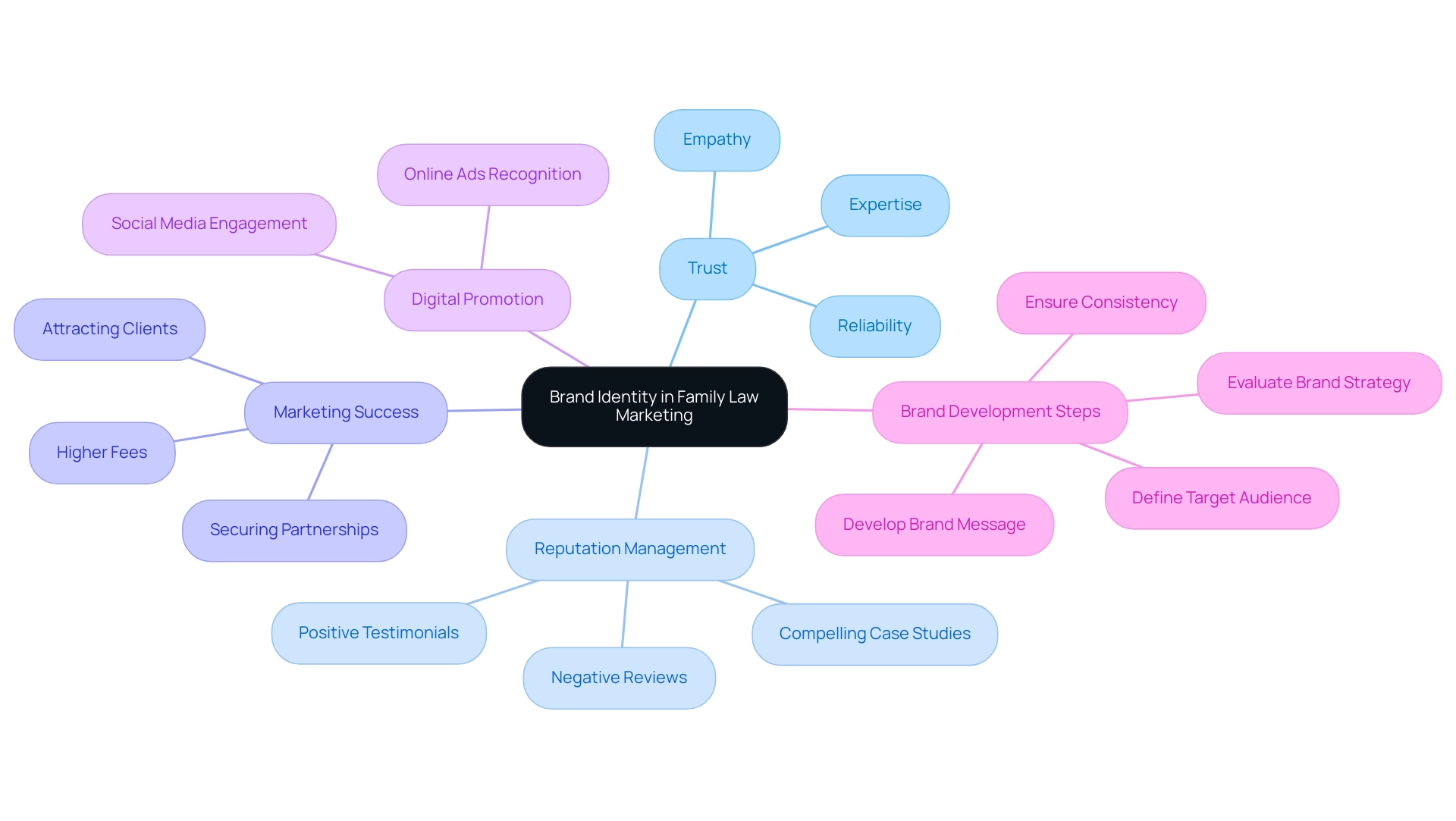
Content Marketing and SEO: Key Strategies for Family Law Firms
For family law practices, marketing for family law, along with content marketing and search engine optimization (SEO), are essential elements for improving online visibility and attracting prospective customers. Developing high-quality, informative content that addresses prevalent family law issues—such as divorce procedures, child custody rights, and mediation options—is crucial for engaging individuals searching for guidance online. By incorporating relevant keywords into this content, companies can significantly boost their search engine rankings, thereby facilitating easier access for clients.
Moreover, incorporating local SEO strategies is essential, as almost 46% of all Google searches relate to local businesses or services, making it crucial for legal practices to focus on location-specific keywords and keep their Google Business Profile current. To enhance their promotional strategies, companies can utilize software tools such as Google Analytics, SEMrush, and HubSpot, which offer valuable insights into legal advertising statistics and assist in guiding decision-making. Regularly updating content and maintaining a consistent blog not only enhances SEO but also establishes the organization as a thought leader in marketing for family law.
As highlighted by CallRail:
The most significant online promotional strategy for legal practices is website optimization, emphasizing the necessity for organizations to prioritize these approaches in their promotional efforts.
With 72% of consumers indicating a preference for a mix of digital and conventional promotional approaches, marketing for family law practices must adjust their strategies to satisfy these changing expectations, highlighting the significance of digital promotion as a crucial factor for boosting revenue.
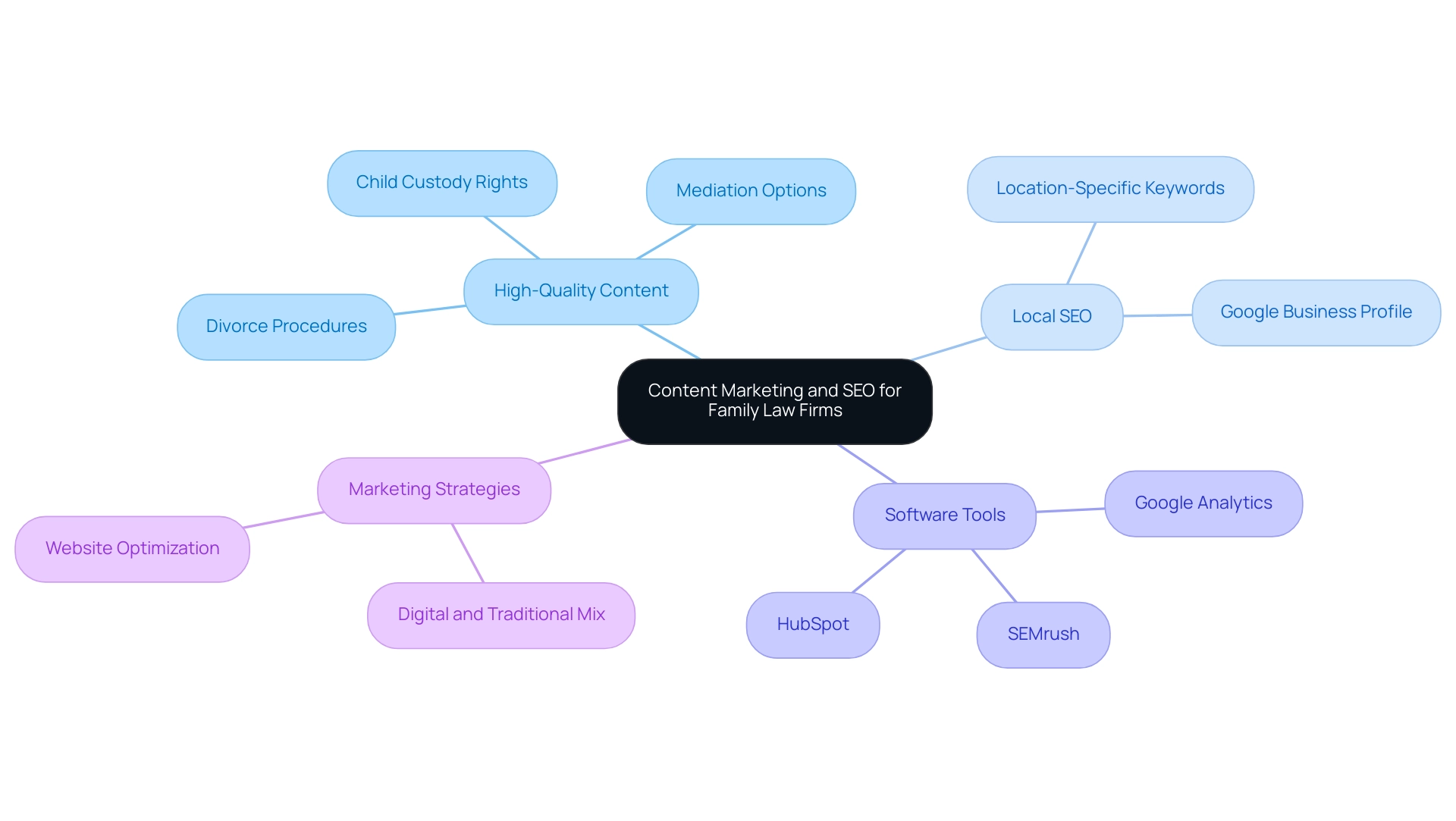
Navigating Social Media and Online Reviews in Family Law Marketing
Social media platforms and online reviews create a unique landscape of challenges and opportunities for marketing for family law. These platforms, such as Facebook, Twitter, Instagram, and LinkedIn, function as effective tools for interaction, allowing companies to share valuable content, connect with potential customers, and showcase their expertise in the field. Importantly, 50% of individuals searching locally for legal services on their mobile devices visit an office within 24 hours, underscoring the urgency and impact of a strong online presence.
A significant change in how prospective customers seek legal assistance shows that many are turning to social media for suggestions and research, demonstrating the evolution in customer interaction that requires effective marketing for family law practices to manage. However, online reviews can significantly impact a company’s reputation; thus, active management of this digital footprint is essential. Family law practices must respond to reviews—both positive and negative—while encouraging engagement on social media.
Encouraging satisfied clients to leave positive reviews can enhance a business’s credibility, whereas addressing negative feedback promptly reflects a commitment to client satisfaction. According to a survey, 75% of lawyers assign less than 10 percent of their budgets to social media, which indicates a substantial opportunity for those willing to invest strategically in this area. Current trends in marketing for family law practices suggest a growing emphasis on video content and personalized engagement in social media, which can further bolster visibility and reputation.
Effectively navigating the complexities of online reviews and social media engagement can significantly enhance a family law firm’s presence in an increasingly competitive market.
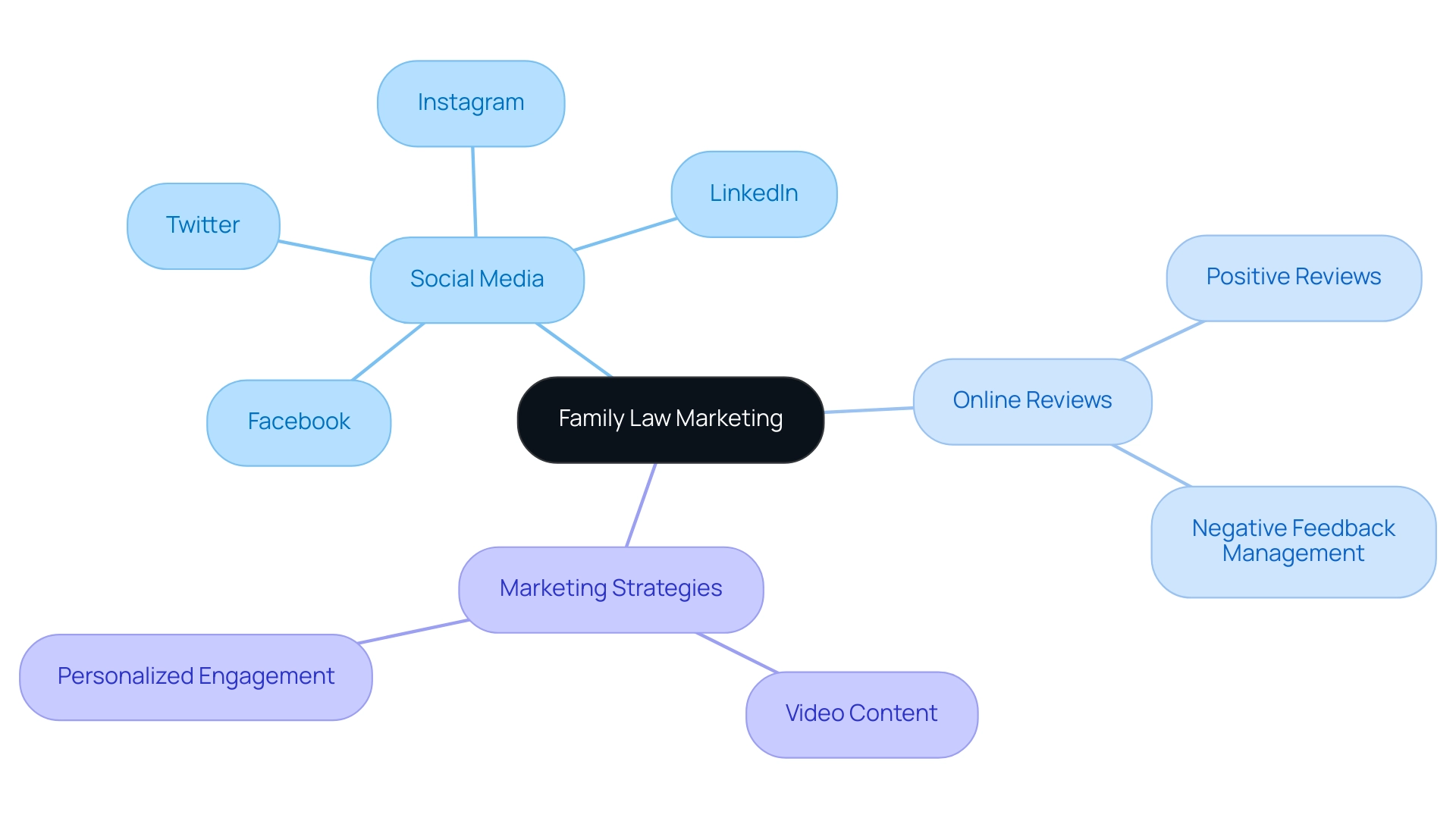
Conclusion
Family law marketing requires a strategic approach that balances outreach with empathy, given the sensitive nature of issues such as divorce and custody disputes. Online visibility is crucial, as many potential clients use mobile devices to find legal assistance. Tools like Google Business Profile and website optimization help ensure firms are easily discoverable and responsive.
Digital strategies are essential for client engagement, with personal touchpoints like phone calls remaining important despite the rise of online communication. Pay-per-click advertising and compelling content are effective in attracting clients actively seeking legal help. An active social media presence further enhances engagement and demonstrates a firm’s commitment to client care.
Building a strong brand identity is vital for establishing trust and shaping client perceptions. A well-defined brand that embodies empathy and expertise can lead to increased inquiries and more effective marketing. Additionally, content marketing and SEO are key for improving online visibility and establishing the firm as a thought leader by providing valuable information tailored to client needs.
In summary, family law firms must adopt a comprehensive marketing strategy that integrates digital engagement, strong branding, and effective communication. By focusing on these elements, firms can navigate the emotional challenges of their field, enhance visibility, and build lasting relationships with clients during critical times.

